Best bread in South Africa
Bake the best bread in South Africa for R6. Bernard Preston must be off his rocker I hear you thinking; a loaf of sourdough normally retails for about fifty rand. If it’s too good to be true then it simply cannot be done; period.
But it is true; I have been baking bread sporadically for thirty-years, and daily for the last ten so it's not all hubris and BS.
But yes there is a catch.
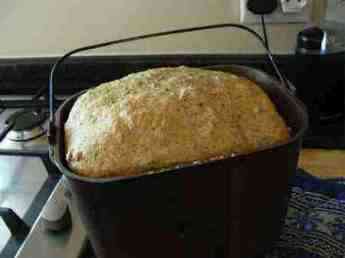
I was first introduced to wheat by a farmer in the Bergville district; a man by the name of Barry Sclanders some thirty years ago. A fine person, he convinced me there is a huge difference between freshly milled 100% meal and the so-called wholegrain flour that is available from the supermarket.
He was right but I did not realise just how spot-on until more recently when I discovered that by international agreement, millers can remove up to 40% of the bran and germ and still call it "wholemeal." It’s a big, fat monumental lie.
“The simple step of a courageous individual is not to take part in the lie. One word of truth outweighs the world.”
Aleksandr Solzhenitsyn
So I inveigled a nephew into bringing me a very heavy mill from Germany, one that is still in daily use having had no repairs in all that time; a little maintenance, yes. And so I bought a 50kg bag of wheat from Barry.
What he didn’t warn me about was the weevil but that
is a story for another day; in short storing your wheat berries for two weeks in a deep-freeze kills all the bugs and their eggs. It is a vital part of baking the best bread in South Africa or anywhere else for that matter.
And so began a journey with baking that continues to this day; only recently I learned how much a teaspoon of lemon juice in the dough improves the texture of your slice. Bread experiments are not only fun but eventually lead to your own unique loaf.
Barry alas is no more but I am still able to purchase 200kg of winter-wheat every year in December from a Bergville farmer. It costs R4 per kilo, delivered at my door, though I will admit to throwing in a couple bottles of natural honey as a sweetener.
In 2020 we bought 500kg but the price has risen to R5,800 per ton; it was still a bargain.
In 2022 the price will go through the roof with the war in Eastern Europe; I'm glad to say we have a large amount in stock.
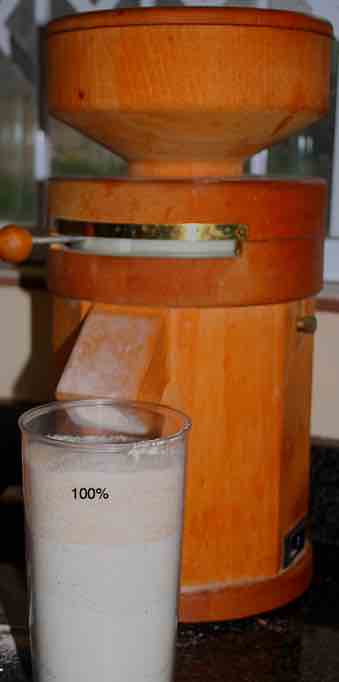
The very inferior supermarket "wholemeal" flour costs four times as much; I’ve been to the mill myself, but they refuse to divulge just how much of the bran and germ they extract. That is sold separately to the companies that manufacture supplements; and to the pig farmer.
The bran is rich in betaine[6]; it's a vitamin-like nutrient that has been used in pig food for over fifty years to prevent marbling of the fat. It would help those suffering from adipose too.
Millers also remove the important fats, vitamin E and much of the protein from the flour; is it any wonder that research now shows that fully a half of the children in some communities are permanently stunted[2]?
This National Panasonic bread-maker had baked many thousands of loaves without a hiccough; then alas nearly 30 years later the paddle seized and damaged the machine beyond repair.
I bought a new one but twiddle the paddle every time before setting the baking-tin in the machine.
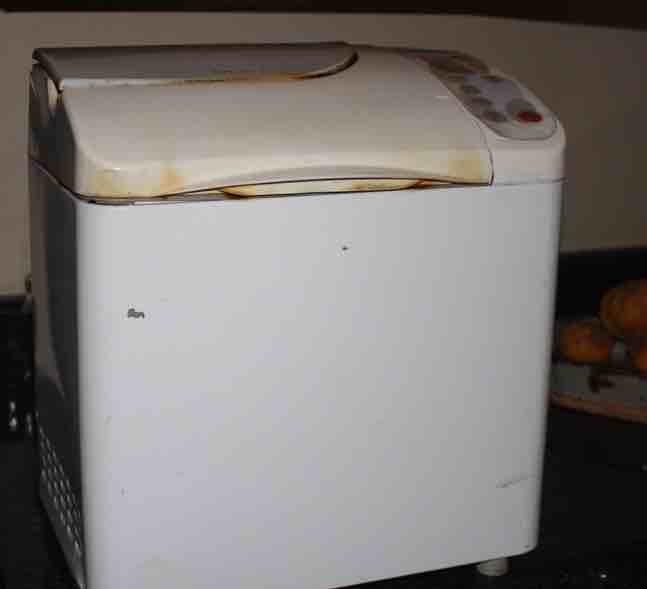
To bake loaves like these there are three major expenses. The flour, the yeast and the electricity; plus a few other items like butter and salt.
If you really want to have the very best bread in South Africa, in the world I’d say you have to add a tablespoon of hummus; and perhaps two more of butternut-soup and a scoop of sourdough starter.
400g of wheat costs me R2.30 in 2021; that's enough for one loaf.
The yeast I now purchase in bulk from a Swiss company, costing about R1 and the electricity if you have a bread-machine is another rand; a lot more in the regular oven.
That came to less than R5 to make a loaf weighing over a kilo in 2013; the standard in SA is only 700g. If you supply your own hummus[3] and butternut-soup you can add a little more to the bill. That's now risen to six rand in 2021.
Then the cost of the sourdough starter for wonderful flavour and pre-digestion of the gluten is that of quarter of a cup of flour; add a teaspoon of raw honey and you have a loaf that tastes so good that it will take your breath away. It really is the very best bread in South Africa and it’s doubtful you will find better anywhere in the whole world.
You will find that one slice of real bread is enough; perhaps another half.
Best bread in South Africa
This is the best bread in South Africa but there is a catch; you need a mill and must locate a farmer who grows the wheat. That's if you want it for R6 per loaf.
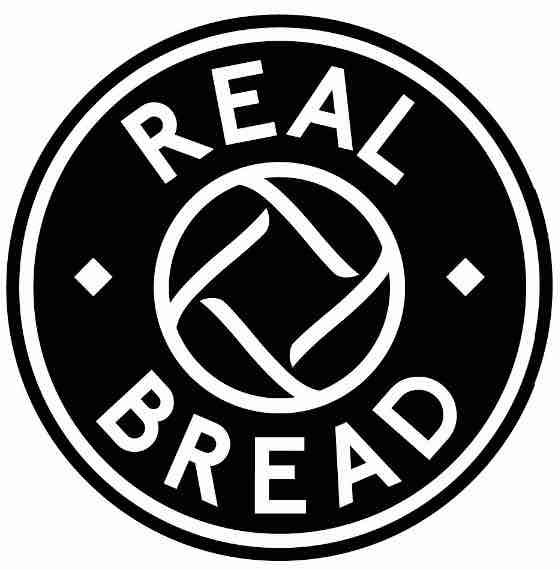 Real bread made from 100% flour.
Real bread made from 100% flour.Interestingly the heart association endorses whole grains like those used to make this bread but even the best from the shops falls far short; it is refined and will certainly raise your blood glucose alarmingly if you are the slightest bit insulin-resistant as a great many South Africans are. And that has been particularly worrying during the pandemic.
The refined-starch used to bake commercial bread is strongly associated with obesity and diabetes.
One large bagel for breakfast and two slices of white bread for lunch amounts to seven servings of refined flour with a 47% greater risk of stroke, according to research in BMJ[1].
A stone mill costs about R6000 from Go Natural[1]
in Somerset West; watch Gumtree for a small oven. Many start the
journey but few are willing to commit five-minutes to have the very best
bread in South Africa. At a saving of forty rand a day for a loaf that will
certainly be inferior to yours, the appliances will be paid off in one
year if you bake daily.
So where do you begin so that you too can enjoy what the Brits are calling real bread? Purchase a little dedicated oven and flour from Champagne Valley in the Drakensberg; if it
takes your fancy then you start your own journey of discovery and greater wellness. Freshly-milled 100% meal is available from Reko Hilton Famers' Market.
If it works for you then you can start hunting for that wheat farmer and your own mill; but first read this page on real and fake bread.
Less than a half of people on the so-called industrial diet of today get enough magnesium from their food; yet it is absolutely required in more than 300 important biochemical reactions in the body. We simple cannot be strong and fit without this vital mineral. The best bread in South Africa made from unrefined flour will supply much of your needs[5].
Bulgur
Bulgur is also a true whole grain made from wheat but quite tiresome to prepare in your own kitchen; it requires many hours and large amounts of energy to dry the cooked grains. They then have to be ground, so you need a mill.
This fried bulgur wheat with turmeric is far simpler; nutritious, tasty and wholesome. It's not been milled.
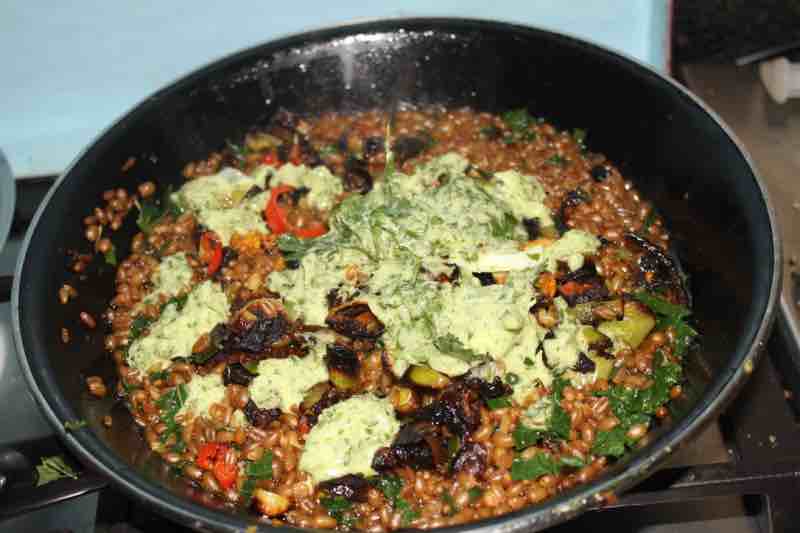
Some folk struggle with pain and bloating after eating bread; it is quite likely caused by the enzymes added by commercial bakers and not the gluten.
Allow your best bread to cool completely; the starch retrogrades[7]. It is less likely to disturb the tum and is less fattening.
Understanding the meaning of gluten is important for all who are painfully trying to avoid wheat; it may be quite needless.
Probiotics
Having gone to the trouble to source the berries, if you enjoy a mild tipple then brewing this 1 gallon wheat beer recipe makes some sense; it's easy and all you need is a large glass bottle.
It also makes an excellent probiotic supplying a broad spectrum of friendly yeasts to the colon.
Malignant tumours
Just one helping of a true whole grain reduces the chance of getting a malignant breast tumour by nearly 50%. When we discuss the best bread in South Africa we are not talking small beer; it can be the difference between life and death.
The Mediterranean Diet as practised does not go far enough to prevent breast cancer since it has been sucked in by the Big Fat Lie; without true wholemeal there are insufficient lignans to provide the protective enterolactones in the gut.
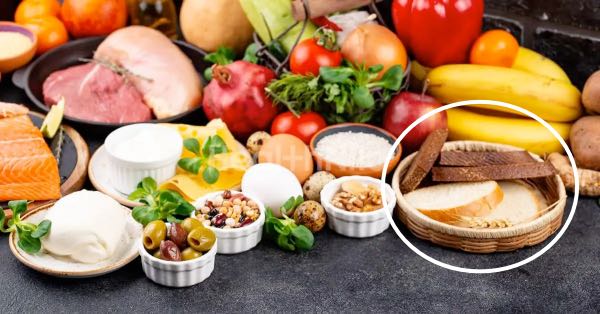
Is 100% wholemeal bread healthy?
True 100% wholemeal bread contains all the vitamins, minerals and fibre in the grain; and important nutrients like choline and lignans that are absolutely essential for wellness.
Overfed and malnourished
Commercial bread is deficient in those parts that stimulate the "incretin hormones." So we feel the need to eat three or four slices to achieve satiety; that means "chronic carbohydrate over-consumption."
Because fibre and so many nutrients have been extracted we are malnourished; starved yet ironically obese.
All best breads in South Africa are baked using 100% wholegrain flour; one slice brings satiety.
When browsing use right click and "Open Link in New Tab" or you may get a bad gateway signal.
The material expressed on this page is gleaned from the nutritional and environmental literature; it is clearly referenced. A plain distinction is made between the author's opinion and that which is scientifically proven. When in doubt consult your health professional.
To suggest a correction or clarification, write to Dr Bernard Preston here. Contact.
Newsletter
Our newsletter is entitled "create a cyan zone" at your home, preserving both yourself and Mother Earth for future generations; and the family too, of course. We promise not to spam you with daily emails promoting various products. You may get an occasional nudge to buy one of my books.
Here are the back issues.
- Lifestyle and ideal body weight
- What are ultra-processed foods?
- Investing in long-term health
- Diseases from plastic exposure
- Intensive lifestyle management for obesity has limited value
- A world largely devoid of Parkinson's Disease
- The impact of friendly bacteria in the tum on the prevention of cancer
- There's a hole in the bucket
- Everyone is talking about weight loss drugs
- Pull the sweet tooth
- If you suffer from heartburn plant a susu
- Refined maize meal and stunting
- Should agriculture and industry get priority for water and electricity?
- Nature is calling
- Mill your own flour
- Bake your own sourdough bread
- Microplastics from our water
- Alternative types of water storage
- Wear your clothes out
- Comfort foods
- Create a bee-friendly environment
- Go to bed slightly hungry
- Keep bees
- Blue zone folk are religious
- Reduce plastic waste
- Family is important
- What can go in compost?
- Grow broad beans for longevity
- Harvest and store sunshine
- Blue zone exercise
- Harvest and store your rainwater
- Create a cyan zone at your home
Did you find this page interesting? How about forwarding it to a friendly book or food junkie? Better still, a social media tick would help.
Address:
56 Groenekloof Rd,
Hilton, KZN
South Africa
Website:
https://www.bernard-preston.com